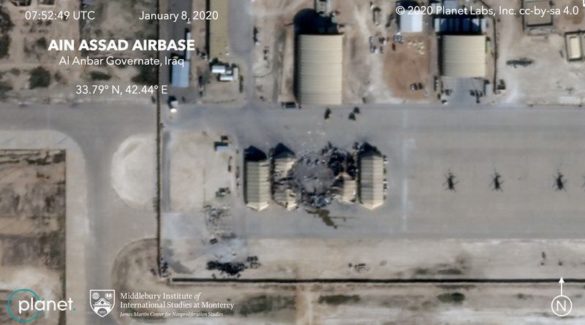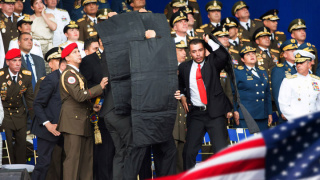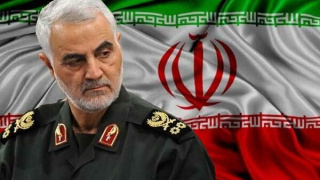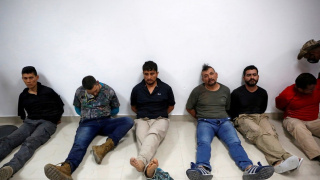On January 3, the US military carried out a de facto assassination of Major General Qassem Soleimani, the Iranian commander of the powerful Islamic Revolutionary Guard special forces al-Quds (Arab for Jerusalem). In the drone attack targeting two vehicles that had just left Baghdad’s international airport, the entire visiting Iranian delegation and the Iraqi delegation who welcomed them were murdered.
A total of ten people were killed, mainly senior officers and some bodyguards. The Iraqi military delegation was led by Abu Mahdi al-Muhandis, commander of Kata’ib Hezbollah, and vice president of the Iraqi People’s Mobilization Forces (PMF), an umbrella organization for the country’s 40 or so Shi’ites. PMF was set up by the Iraqi Parliament in 2014 to fight the Islamic State (IS) and since 2016 has been part of Iraq’s security forces. They are sometimes referred to as militia, but the designation is incorrect as they are considered soldiers in Iraq’s army. Together with Iran’s national hero Soleimani, they were crucial in reversing IS’s progress in Iraq.
Iraq and Iran loudly condemned the attack and soon Tehran and Washington were in such a threatening exchange of words that many believed that they were on the brink of a major war.
Israel and IS rejoice
The Pentagon stated shortly after the attack that it had occurred on President Donald Trump’s orders. The assassination of two top commanders from countries that the US is not at war with made world history, as it violated both US law, bilateral agreements with Iraq, and last but not least, international laws and norms. Thus, Trump and the US created a very dangerous precedent. No such thing has happened in modern history and it has caused many top politicians, military and diplomats to squirm uncomfortably. Many also condemned the act. Russian Foreign Minister Lavrov said the murder “flagrantly violates the principles of international law” and Malaysian Prime Minister Mahathir Mohamad likened it to the state-sanctioned torture of Saudi dissident and journalist Jamal Khashoggi at Saudi Arabia’s Consulate in Istanbul 2018.
However, there were two actors who openly praised the US murder of the anti-terrorist general. One was the terror group IS which described it as a “divine intervention” that will help them make a comeback. The other was Israel and its Prime Minister Benjamin Netanyahu, who thought Trump “deserves all the praise”.
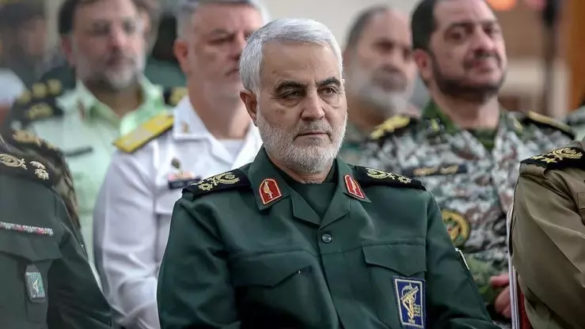
Qassem Soleimani was seen as a hero in Iran and millions of people went out into the streets to show their grief and anger. Photo: asia-news.com
Even the attitude in the Western media — which normally does not miss an opportunity to undermine or smear Trump — was very telling when they suddenly praised Trump and the lawless murders.
Background to the attack
Trump’s order to murder Soleimani, whom he called “the worst terrorist in the world”, was motivated partly by allegedly planning an “immediate attack” on US targets – which were not specified – and partly as a revenge for Iraqi Shi’ites shooting US targets in Iraq. On December 27, an American mercenary and two of the Iraqi security forces were killed in a rocket attack on the Iraqi-US K-1 airbase in the Kurdish-dominated province of Kirkuk in northeastern Iraq. Four American soldiers were also injured. However, the United States had already avenged it by attacking five sites belonging to Iranian-backed Iraqi Kata’ib Hezbollah two days later, killing no less than 25 militiamen and injuring 55. Washington was upset over the storming of the gigantic (50 hectare) US embassy in Baghdad on New Year’s Day and the protests growing at the turn of the year outside the same complex. It evoked unpleasant memories of the hostage drama at the US Embassy in Tehran in 1979.
Free West Media’s US sources argue that Washington’s Israel lobby took advantage of the situation and managed to convince Trump that the US must launch more attacks on “Iranian targets”. Following the US air strikes, a review was held at Trump’s summer residence Mar-a-Lago, Florida, where the Pentagon presented several alternatives. The Defense Headquarters has the habit of presenting one or more extreme alternatives in order to influence the incumbent president to accept the alternatives the military sees as most desirable, which can thus be presented as more legitimate. The most extreme suggestion was a targeted murder of Soleimani. To the surprise of those present, this was what Trump chose.
After the attack, Trump threatened a terrorist bombing of Iran if it somehow answered Soleimani’s murder. On his Twitter account, he wrote that 52 goals were selected, “some at a very high level & important for Iran & the Iranian culture”, which would then be destroyed. It was deemed too strong a response, even by the United States’ foremost ally after Israel: the UK. Britain’s Prime Minister Boris Johnson withdrew from Trump’s threat and warned the US president against bombing cultural sites as it violates international law.
Lured into the trap
The New York Times (NYT) establishment magazine blamed the murders with the words “The air attack would have been canceled if Soleimani had been on the way to meet Iraqi government officials in line with [read: obey] the United States”. However, there is an important clue in this sense, which has been reproduced in countless Western media and on sites such as Wikipedia. Well-known Kuwaiti journalist Elijah J. Magnier, chief correspondent of Kuwait’s biggest daily Al Rai, reveals why the Western establishment feels compelled to try to drum up this message.
Magnier, who cites Iraq’s Prime Minister Adil Abdul-Mahdi as a source, reveals that Soleimani came to Iraq following a formal invitation from the country’s government. Officially, the Iranian general was there to attend the funeral of the 25 Iraqi soldiers whom the US bombed six days earlier. That is why he was met by an Iraqi military delegation. Magnier, however, comes with a much more serious disclosure and that is that Soleimani’s real reason for traveling to Iraq was to meet the country’s prime minister and receive a peacekeeper from the Trump administration, who was sent to Iraq via Saudi Arabia.

In Soleimani’s hometown of Kerman, several million people gathered to say goodbye to the national hero. Photo: IRNA
Magnier tweeted on January 5:

#Iran #IRGC commander #QassemSoleimani managed to reach with his death what he couldn't reach when he was alive. That is his last spectacular act for Iran and for the "Axis of the Resistance": legislation forcing the US to withdraw and cease all kind of collaboration.
We have learned today from #Iraq Prime Minister AdilAbdl Mahdi how @realDonaldTrump uses diplomacy:#US asked #Iraq to mediate with #Iran. Iraq PM asks #QassemSoleimani to come and talk to him and give him the answer of his mediation, Trump &co assassinate an envoy at the airport
If this information is correct, the United States had lured Soleimani into a trap on the pretext of wanting to discuss peace.
United Iraq wants to throw out the United States
The United States’ atrocity has united Iraq and on January 5, the otherwise divided parliament voted in an extra-partisan meeting to throw the United States out of the country. The United States announced the same day that it had interrupted its efforts against the Islamic State as well as its support for the groups that are against IS. Instead, focus should now be on “defending their military bases” in Iraq from Iran-allied militias in the region that are currently fighting terror groups such as IS and al-Qaeda.
On January 10, the Iraqi Prime Minister urged the United States to begin the withdrawal of its forces located “in Iraq without a permit”. The powerful Iraqi Shia leader Muqtada al-Sadr, who is known to be critical of Iran, has ordered the re-establishment of his powerful Mahdi army, once feared by US occupiers. Even Sheikh Mehdi Ahmed al-Sumaidaie, the Sunni Grand Mufti, became angry and urged Iraqi Sunnis to stand with their “Shiite brothers” and evict the Americans. “My army and I are ready to destroy America, the great Satan. God is with us and we shall prevail. Words and no songs that teach burning in the ears of those who want Iraq to remain fragmented.”
Trump responded to the Iraqi parliament’s decision by threatening sanctions more harsh than those against Iran and Foreign Minister Pompeo, who had made himself known to cameras before by boasting that the CIA “lied, cheated and stole” when he was the CIA chief, said quite rudely that he was “convinced that the Iraqi people want the United States to continue to be there.”
Even though the now burgeoning conflict cost the Iranian side around 230 lives – if we count the fifty people who were trampled to death at Soleimani’s funeral when millions of mourners wanted to show their participation and anger, and the Ukrainian aircraft that Iran shot down accidentally – the US has lost only mercenary soldier so far. This is when the US will eventually be forced to leave Iraq and much of the Middle East. The assassination of Soleimani will in the future be seen as a milestone in this process, which has now started. Iran, which responded with a moderate robotic attack on a pair of US bases, about which Washington was alerted via Baghdad and therefore did not lead to any US losses, has said it was just a marking and that the actual retaliation will just be the US being kicked out.
Surprising precision
The Iranian robotic attack on January 8, which the Western media tried to portray as failed and unsuccessful, was just the opposite as it revealed two alarming facts for the US and Israel. In this first attack on US facilities, Iran demonstrated its ability to strike with high precision even with its simpler short-range robots, Fateh-313 and Qiam-1, which have been upgraded with new targeting systems. Satellite images show that at least six buildings on the gigantic Ayn al-Asad airbase, as well as a taxi and runway, had direct hits, “perfectly in the bullseye” according to one analyst. In total, around ten robots seem to have hit the base and since all the buildings there occupy just over 1.5 percent of the surface, it is quite unlikely that they were hit by chance. Iran also showed that the United States lacks the ability to defend itself against an air attack with ballistic robots, which is significantly easier to fight than suicide bombers and cruise missiles. This fact has to be taken into account by the Pentagon’s planners and hotheads in Washington – not to mention the war in Israel, which is within the reach of countless Iranian robots.

